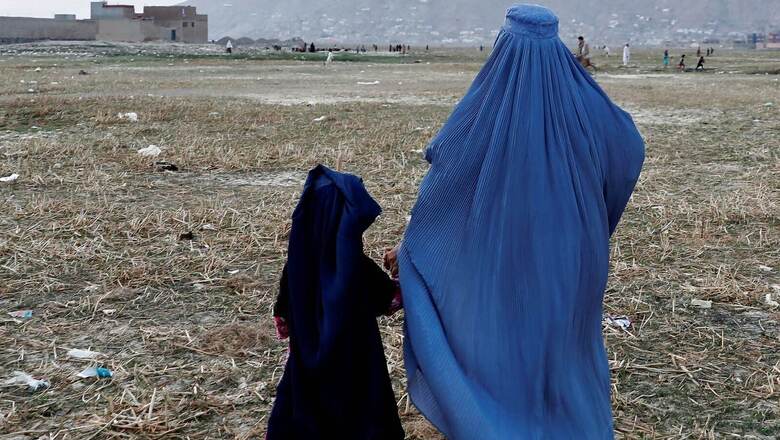
views
“In a matter of a few hours, all our rights were stripped away, multiplied by zero.”
“Don’t we Afghan women have the right to live?”
“It is too painful to even wear a burqa now.”
Having fought a long-drawn battle for autonomy, the dreams of many women in Afghanistan were dashed over the past week as the Taliban ransacked several Afghan provinces and staked claim to its capital city, Kabul.
The start of the offensive came after US forces and other international troops began to withdraw from the country in May. As the government began losing power to the “barbaric” regime, the women also saw their lives and aspirations slowly slip away.
Speaking to CNN-News18 on Monday, the accounts of several Afghan women trapped in the confines of their homes echoed despair, helplessness, and, above all, resignation to their fate.
Prisoners of war
A Fulbright scholar, Sediqa, says her worst fears came true when she was left helpless while watching her siblings caught in the throes of firing.
“Yesterday, my sisters were caught in the middle of a fight. They were screaming and crying but I couldn’t run and help them. I was scared of never making it and getting killed on the way. So I watched as my siblings struggled to stay alive. It was the worst feeling ever,” she said.
Coming from a family of 8, Sediqa had completed her post-graduation in social sciences from the USA and had dreamt of making it big in life. She was working for an international NGO in Afghanistan when, overnight, her world turned upside down.
As news spread of Taliban henchmen storming individual homes and looking for activists, NGO workers and government officials, Sediqa was forced to burn all her academic documents.
A similar sentiment was echoed by Fatiha who spoke with sorrow as she shared an email of her upcoming entrance test for the South Asian University on August 25 and 26, and said that there is no way she will be able to give the exam now.
A former employee of the Ministry of Interior Affairs, Fatiha had just lost her job and expressed her anguish over the possibility of a bleak future.
“We study to have a bright future, to put the knowledge we gain to use in the service of our country. But now, with no education, we cannot live like humans. Our homes have been sold to the terrorists. We can no longer sing or write,” she said.
‘We’ve travelled back 20 years’
In 1996, the Taliban were a terror to all around. Internationally known for their violent treatment of women, the Taliban’s rule was based on Pashtunwali beliefs about living in purdah.
This led to a form of gender apartheid where women were denied many of their basic rights. Some of them were right to employment, right to education, forced adherence to a certain type of clothing involving burqa, and the need to be chaperoned around by a male companion even for health check-ups, where they were not allowed to be treated by a male doctor.
The failure to obey often resulted in public flogging and execution.
After the Afghans gained freedom in 2001, it still remained a conservative Islamist country. But the nation now belonged to a generation of men and women more urbane, more progressive, and it was one that had come of age after the fall of the Taliban.
However, when Kabul fell into the hands of the fundamentalists yet again after 20 years on Sunday, it dealt the gravest blow to this very generation of women who had lived almost a decade with little to no memory of the oppressive treatment meted out to their ancestors.
“Seems like we have travelled 20 years back,” an Afghan woman activist told CNN-News18, who feared the same predicament as her mother’s who was stoned to death two decades ago.
“We studied, we worked hard, we went to the university, we ate bread and water, we never rented a car, we walked for hours. All that for what… Our dreams were so easily destroyed. We who have been fighting for women’s rights in Afghanistan have been stripped of our own rights overnight and today we lay exposed as the ones most at risk. We deserve better,” said a woman journalist from Herat who did not wish to be named.
No woman’s land
While fleeing the country is being contemplated by many women as their only chance of survival, the requirement of visas and the trauma of living as an immigrant has been preventing many from taking a leap of faith.
“On August 15, when I went out for something urgent, I was appalled at the treatment of the Taliban towards the women. We are stopped from going anywhere, mocked, ridiculed in public. And what has completely eroded our morale is that only women are being subjected to this extremism. It is the worst time to be born a woman,” said Zahra Kazemi, a student
But even as the paths they travelled, the schools they attended turn into nothingness, these women are determined to find a way out, as for them and the generation to come, this might be the start of the terror of the Taliban of today—that is better financed, more sophisticated, has more military support, has mastered social media and, to top it all, has just tasted a major victory.
Read all the Latest News, Breaking News and Assembly Elections Live Updates here.




















Comments
0 comment